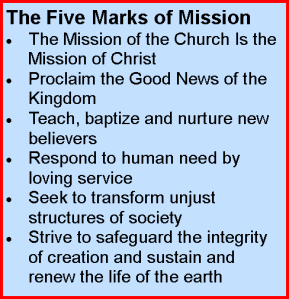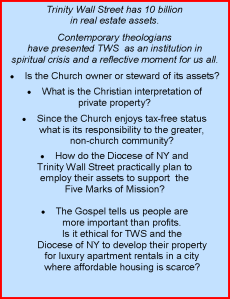I not only gave up Lent for Lent this year, I also gave up blogging. There are times when the impulse to come to conclusions prevents living mindfully in God’s time. Strict adherence to arbitrary calendars, deadlines, and relentless standards also prevents us from living mindfully and compassionately.
Yet another good reason not to attend church for Lent. Jesus goes out on the desert to discern his life’s mission, and we’re asked to sit like cattle while the church staff tells us what this is all about.
 We are poor little sheep who have lost our way…baa, baa, baa.
We are poor little sheep who have lost our way…baa, baa, baa.
A while back I was at a staff meeting planning the parish events for the year. The organist-choir director looked at the calendar sighing dramatically. “There is absolutely no place for us to have a choir fundraiser for our trip to England!”
I pointed out a nice empty weekend in March – not a schedule conflict in sight.
“But that falls on the second weekend in Lent!”
“And the problem is….?”
“We want to have a festive atmosphere in order to raise money!” There was scorn in his voice; you could hear the bumper “Dummy!” in his inflection.
I explained to him that some very great thinkers in the church had experimented with not observing Lent. Holy Week, of course, but Lent was made from whole cloth. Just as New Year’s Eve is party night for amateurs, living a disciplined prayerful life for exactly 40 days seems to miss the point. Moreover, hadn’t we all experienced people who gamed the system? Those who conflate sacrifice with vanity or self congratulation, or those who are eager to drop their discipline on Sundays when it’s “technically” a mini-Easter? (40 days minus Sundays = piety.)
The implication that I was a dummy gave way to a look from the clergy and organist as if I was suggesting the sacrifice of goats to Baal on the altar. The rector said that no weddings or baptisms would ever take place in “his” church during Lent.
Silly me! I thought that the church belonged to the Body of Christ, but it really belongs to the clergy collecting a salary from the Body of Christ.
And for those of us with birthdays that occur during Lent, I suppose this priest would have us wear hair shirts as we sup on soup instead of ice cream cake. Darn, if only I had been born during the season of Pentecost, I could enjoy my birthday in a festive atmosphere.

This is the week that we remember the most important part of Jesus’ story. Even though we are intimately familiar with it, each day, each story has its own vibration. If we tune in, we will hear a distinctly unique pitch sounding from the past, present, future, this world, and the other world all at once.
The vibration on Holy Saturday sounds the story of the women waiting to honor in death their beloved friend and rabbi. They ready themselves to prepare not only his body, but for the reality of transition that is sure to come.
Too bad so many miss this part of the story. The church staff is exhausted from coordinating “correct” Palm Sunday processions, Tenebrae services, forcing people into ritualized intimacy with Maundy Thursday liturgies, (it took me years to really hear that foot washing in this artificial situation is indeed gross for the average citizen!), getting everyone on board for the ecumenical Good Friday service, hiring the brass ensemble to replicate the shadow of a joyous Easter morning…and I forgot to include the Great (or typically Not-So-Great) Vigil of Easter.

An elder in a church where I used to sing, called this the “hot dog cooker” service. Maybe she was on to something.
Exactly how the institutional church remembers this week is the topic of another post. And another, and yet another. The liturgical year is a teaching opportunity about the life of Jesus, not what we worship instead.
In the northeast United States – and possibly other parts of the country – no matter how honest and holy and well-intentioned the remembrances of Holy Week are, attendance is low. It is spring break in the public schools: AKA “Mud Week” because it’s like trying to get wheel traction in thick mud.
I can’t count the times I’ve worked with teams planning and executing great Easter Eve Walks, powerful Palm Sunday experiences, sincere Maundy Thursday meals, celebratory Easter mornings, and a fraction of the parish population has shown up. Or the ecumenical youth group has forgotten what they were supposed to do at the sunrise beach service because they took a red-eye back from a warm, hedonistic locale and are fried.
What are leaders supposed to do about this? Condemn those on vacation?
Take a tip from the early Christian strategists and work with the culture. Jesus, like the Queen of England, has two birthdays – a real one and one the public celebrates in December.
 Palm Sunday
Palm Sunday
Yes, the liturgical year is a helpful way to frame time. But when the consumer culture co-opts the Easter egg hunt so it is about competition, over-buying plastic eggs and other doo-dads from Oriental Trading, it’s time for the church to stand for something. Putting on a lonesome high-church chant fest for 20 people on Holy Saturday with the hot dog cooker and singing the Exultet is fine. But the next weekend – Easter 1 – when all the kids, families, DINCs, retirees, singles, and young couples return from a much-deserved break, tell the story again. Save breakfast on the beach reading for the summer by making breakfast on the beach!
Make it live for yourself and it will live for those around you. An interesting side effect of rescheduling is that we don’t have to live with the cognitive dissonance of pretending we don’t know about the resurrection. What an interesting contemplation. We already hold the sad knowledge of Good Friday when we re-enact the Last Supper. What if we also held in our hearts the knowledge of the Resurrection?
There is a tale that the founder of Hasidic Judaism, when faced with a problem, would go to a sacred place in the woods, ritualistically light a fire, and say a particular prayer. The rabbi would then gain insight. His successor knew the place in the wood and the prayer, but did not know how to light the fire. He also, would come to a new understanding. With each succeeding generation, a bit of the ritual would be lost. When Rabbi Israel of Rishin was confronted with a problem, he stayed at home. “The fire we can no longer light, the prayer we no longer know, nor do we remember the place. All we can do is tell the tale. And that is sufficient.”
Let us go on telling the tale, and to paraphrase St. Francis, sometimes use words.





















